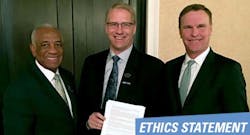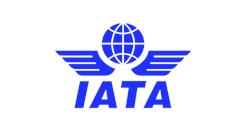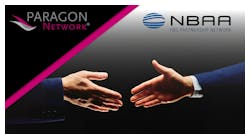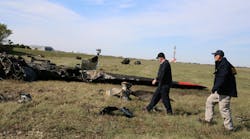The National Business Aviation Association (NBAA) is the leading organization for companies that rely on general aviation aircraft to make their businesses more efficient, productive and successful. The industry’s strong ethical culture has remained a unique hallmark, one deserving of both pride and attention. Embracing a culture of ethical behavior supports NBAA’s mission to foster an environment that allows business aviation to thrive in the United States and around the world. By retaining a positive image, both within the community and among the public at large, business aviation will succeed and grow.
All industry participants – whether representing the buyer or the seller of any products or services – should conduct themselves in a manner that seeks to avoid even the appearance of improper behavior when engaging in business transactions. NBAA encourages business aviation professionals to become familiar with existing company policies or, in the absence of them, to develop internal policies and regularly conduct training on issues of ethical behavior. These policies are broadly designed to deter wrongdoing and to promote: (1) honest and ethical conduct including the ethical handling of actual or apparent conflicts of interest; (2) fair, accurate, timely and understandable disclosure; and (3) compliance with applicable governmental laws, rules and regulations. The following topics highlight, in plain English, best ethical practices for transactions in our industry which are in addition to applicable state, federal and international laws.
A good rule of thumb is to ask this question: “How would my actions appear on the front page of a national newspaper?” Would your actions appear honest, professional and ethical? Or could such exposure cast negative light on your reputation and that of your company and the industry?
The terms “business aviation professional” and “company” are used below as these best practices are equally applicable to everyone in the industry – direct employees, contract employees, advisors, brokers, consultants, management companies, and other agents – who are representing a company or an individual in any transaction.
Honest and Ethical Conduct
All business aviation professionals must always conduct him/herself in an honest and ethical manner. Everyone must consistently adhere to the highest standards of personal and professional integrity and not tolerate any attempts to deceive or evade responsibility for actions. Business aviation professionals must maintain confidentiality by avoiding inappropriate disclosure of information.
Conflicts of Interest
A “conflict of interest” occurs when a person’s private interest interferes in any way (or even appears to interfere) with that of the company the professional is representing. A conflict situation can also arise when one takes actions or has interests that may make it difficult to perform his or her work objectively and effectively. It is reasonable for companies to expect business aviation professionals representing them will perform their duties conscientiously, honestly and in the best interests of the company. Such professionals must not use their position or any knowledge gained as a result of their position for private or personal advantage.
Conflicts of interest may also arise when an individual or a member of his or her family solicits, is offered, or receives improper personal benefits or emoluments (e.g., finders fees, kick-backs, undisclosed rebates or commissions) as a result of his or her position working for the company.
Regardless of the circumstances, if a course of action an individual pursues risks generating a conflict of interest with the company, that person has a duty to disclose this fully to the company by immediately communicating all the facts to his or her supervisor or in accordance with company procedures. All actual or apparent conflicts of interest between personal and professional relationships must be handled honestly and ethically.
Like many industries, there are a variety of loyalty and rewards programs available to business aircraft owners and operators. NBAA recommends that business aviation professionals discuss with their supervisors the programs in which they participate and together develop processes, procedures and guidance clearly articulating expectations for program rewards and other benefits to prevent conflicts of interest.
Company Funds and Other Assets
Business aviation professionals who have responsibility for or access to company funds in any form must follow the prescribed procedures for recording, handling and protecting money as detailed in company’s policies. Companies impose strict standards to prevent fraud and dishonesty. If a business aviation professional becomes aware of any evidence of fraud and dishonesty, he or she should report the information to a supervisor or follow the company’s whistleblower procedures. When a business aviation professional’s position requires spending company funds or incurring any reimbursable expenses, that individual must use good judgment on the company’s behalf to ensure that good value is received for every expenditure. A company’s funds and all other company assets are to be used only for that company’s purposes.
Business Records
Business aviation professionals have an obligation to maintain complete and accurate business and financial records. Details of all transactions must be appropriately documented, in the proper period and in accordance with generally accepted accounting principles. Documents must be retained and destroyed in accordance with a company’s retention policy.
Compliance with State, Federal and International Laws
Business aviation professionals must be mindful of the numerous professional ethics rules (e.g., for lawyers or accountants), state and Federal laws and regulations that may apply to an individual’s or company’s activities. For example, the U.S. Foreign Corrupt Practices Act prohibits giving anything of value, directly or indirectly, to officials of foreign governments or foreign political candidates in order to obtain or retain business. Similar laws have been adopted by other countries. Business aviation professionals must avoid making illegal payments to government officials of any country. In addition, many governments have laws and regulations regarding business gratuities that may be accepted by their personnel.
Further, commercial bribery (i.e., where there is no government official involved) is a criminal offence under certain state, federal and foreign laws. Business aviation professionals must familiarize themselves with the applicable rules. Violations of these laws can result in sanctions against both the individual and the company.
NBAA recognizes the business aviation industry’s commitment to ethical behavior and will continue to be a leader in this effort.





